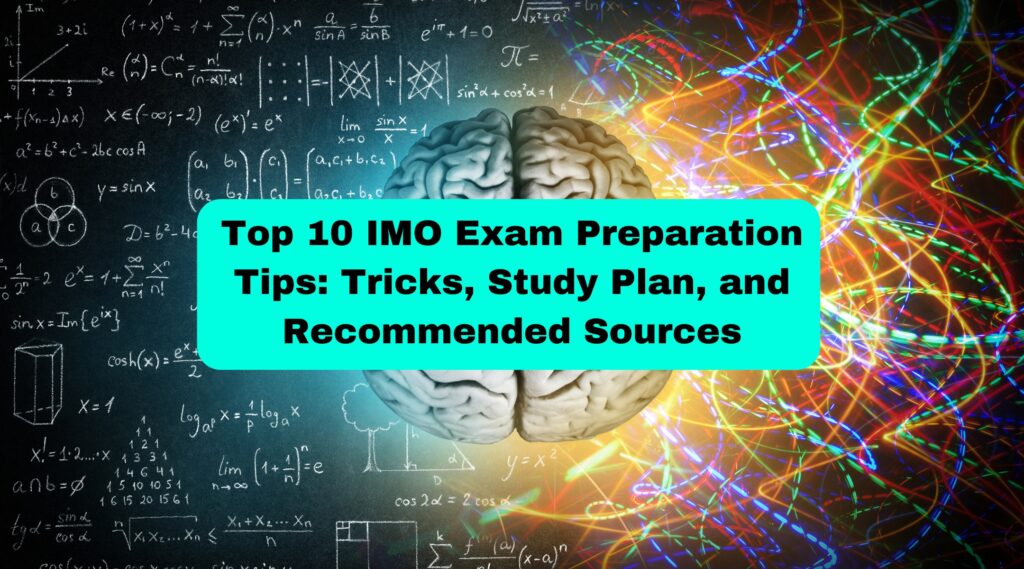
Top 10 IMO Exam Preparation Tips: Tricks, Study Plan, and Recommended Sources
The International Mathematical Olympiad (IMO) is the world’s most prestigious and challenging mathematics competition for high school students. Aspiring young mathematicians worldwide aim to represent their countries in this elite competition. Success in the IMO requires more than just understanding school-level math—it demands creative problem-solving, critical thinking, and an innovative approach to complex mathematical problems. If you are preparing for the IMO, here are 10 tips to help you plan your preparation, improve your skills, and maximize your chances of success.
1. Understand the IMO Exam Structure
Before diving into preparation, it is essential to know what you are preparing for. The IMO consists of two days of testing, with six questions (three per day) covering topics such as:
- Algebra
- Number Theory
- Geometry
- Combinatorics The questions require proof-based solutions, meaning it’s not enough to simply find the correct answer—you need to explain how you arrived at it. Each question is worth 7 points, making a total of 42 points. Knowing this will help you focus on developing a deeper understanding of concepts.
2. Master Core Topics
IMO problems typically come from four primary branches of mathematics: Algebra, Geometry, Number Theory, and Combinatorics. Make sure you’re comfortable with topics like:
- Polynomials and inequalities (Algebra)
- Congruences and divisibility (Number Theory)
- Triangles, circles, and angles (Geometry)
- Permutations, combinations, and pigeonhole principle (Combinatorics) Instead of memorizing formulas, aim to understand the underlying principles and how they can be applied in various contexts.
3. Solve Previous IMO Problems
Solving past IMO problems is one of the best ways to familiarize yourself with the level of difficulty and types of questions asked in the exam. Websites like Art of Problem Solving (AoPS) and Brilliant.org offer collections of past IMO papers along with solutions.
- Begin by solving the problems on your own.
- Review the solutions only after you’ve given your best effort.
- Analyze the techniques used in the solutions to broaden your problem-solving toolkit.
4. Break Down Problems into Simpler Parts
IMO problems can seem daunting at first glance. The key is to break them down into simpler sub-problems and tackle each part step-by-step. Ask yourself:
- What is the goal of the problem?
- What information is provided?
- Are there any patterns or symmetries you can use? This approach makes seemingly complex problems more manageable and reduces the likelihood of getting stuck.
5. Focus on Proof Writing
Unlike school exams, where finding the correct answer may suffice, IMO requires you to write clear, concise, and logical proofs. Practice writing detailed proofs and explanations for each solution. Some tips to improve proof-writing:
- Clearly define all terms, variables, and assumptions.
- Avoid gaps in logic; each step must follow from the previous one.
- Review solutions from experts or past IMO medalists to see how they structure their proofs.
6. Use Online Learning Platforms
There are several excellent online resources designed specifically for math Olympiad preparation:
- Art of Problem Solving (AoPS): Offers forums, resources, and classes that cover a wide range of topics from basic to advanced math. The AoPS Olympiad Books series is particularly useful.
- Brilliant.org: Provides interactive problem-solving courses for algebra, geometry, combinatorics, and number theory.
- Khan Academy: Though not focused solely on Olympiads, Khan Academy has a wealth of material to strengthen your basics in math.
7. Build Intuition with Problem-Solving Strategies
Learning how to approach a problem is as important as knowing mathematical concepts. The following strategies can help:
- Work Backwards: Start from the desired outcome and figure out what conditions are needed to reach that conclusion.
- Consider Simple Cases: Test the problem with smaller numbers or simpler shapes to gain insight.
- Generalize Patterns: Look for recurring structures or patterns and try to generalize them to solve the problem. By practicing different strategies, you’ll develop intuition that can guide you during the exam.
8. Form a Study Group
Preparing for the IMO can be an isolating journey, but working with peers can make a big difference. A study group allows you to:
- Discuss different approaches to solving problems.
- Get feedback on your proofs and solutions.
- Stay motivated through regular interaction with others who share your goal. You can join online math communities like the AoPS forums or local math clubs to connect with like-minded individuals.
9. Create a Study Plan
Given the vastness of the syllabus and the complexity of problems, having a structured study plan is essential. Here’s a suggested plan:
- Daily Practice: Dedicate at least 1-2 hours each day to solving Olympiad-level problems.
- Weekly Topic Focus: Focus on one topic (like algebra or combinatorics) each week and solve problems related to that area.
- Mock Tests: Once a month, simulate exam conditions by taking timed tests using past IMO papers.
- Review Mistakes: After solving problems, review your mistakes carefully. Understand where you went wrong and how you can avoid the same mistake in the future.
10. Recommended Books for IMO Preparation
Books written by experts in the Olympiad field can be invaluable to your preparation. Here are some highly recommended ones:
- “The Art and Craft of Problem Solving” by Paul Zeitz: This book offers an in-depth guide to mathematical thinking and problem-solving strategies.
- “Mathematical Olympiad Challenges” by Titu Andreescu and Razvan Gelca: A fantastic resource for practicing challenging problems and learning creative techniques.
- “Problems in Elementary Number Theory” by Titu Andreescu: For those looking to sharpen their number theory skills, this book provides a solid collection of problems.
- “Geometry Revisited” by H.S.M. Coxeter: A classic book that covers many topics in geometry relevant to the IMO.
- “An Excursion in Mathematics”: This book is great for anyone preparing for regional and national Olympiad stages, with problems that gradually increase in difficulty.
Conclusion
Preparing for the IMO is no easy feat, but with the right approach, dedication, and resources, it’s certainly possible to succeed. Focus on deepening your understanding of mathematics, practice problem-solving regularly, and refine your proof-writing skills. By following these 10 tips, you can develop the confidence and ability to tackle challenging problems and improve your chances of representing your country at the International Mathematical Olympiad. Happy studying and good luck!



